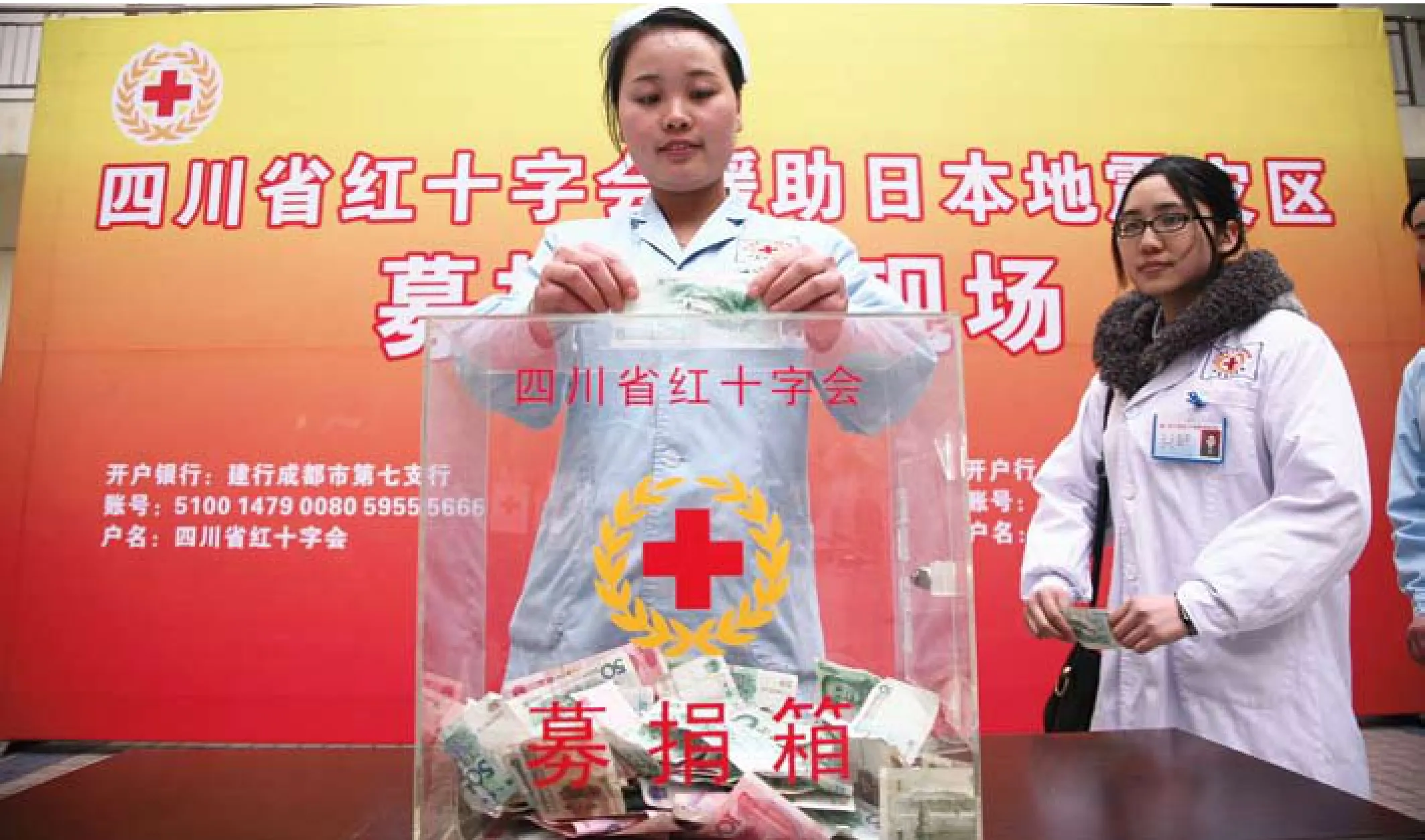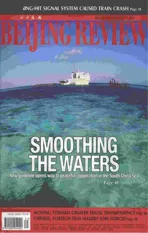The Red Cross At a Crossroads
2011-10-14ByYUANYUAN
By YUAN YUAN
The Red Cross At a Crossroads
By YUAN YUAN
The Red Cross Society of China faces a serious credibility crisis and tries to regain public trust
Guo Meimei has become a household name in China since late June. On June 21, she caught the attention of netizens for the frst time by posting pictures of her lavish lifestyle on Weibo.com, a Twitter-like microblogging website. The photographs feature fast cars, designer handbags and a palatial villa.
This sort of extravagance isn’t unusual in today’s China, but the fact that Guo, whose real name is Guo Meiling, claimed to be general manager of a company called Red Cross Commerce and just 20 years old drew attention to her brash posting.
Online message boards and blogs were soon awash with questions.
How did she become general manager at such young age? What exactly is Red Cross Commerce? Where does all her money come from?
Determined netizens uncovered more information on Guo and suggested her wealth was the direct result of corruption within the Red Cross Society of China (RCSC).
The furry of online activity soon brought to light that Guo was not from a wealthy family and just fve years ago, it seems, she was living in a rented fat with her mother.
Five years later, however, she began to faunt her Maserati and Lamborghini sports cars, vaults of designer bags and palatial villa.
“How did this happen?” asked dozens of microbloggers.
Embezzled money from the RCSC was the conclusion most people came to.
Research by enraged netizens discovered Guo’s boyfriend, Wang Jun, was a businessman in Shenzhen, a boomtown in south China’s Guangdong Province. Wang was a board member of Zhonghong Boai Asset Management Co. that is connected to the RCSC. However on June 26, fve days after Guo’s microblog posting hit the headlines, he resigned from his position in the company. This resignation only strengthened people’s suspicions that Wang and Guo’s fortune stemmed from their dealings with the RCSC.
On June 28, the RCSC held a press conference, denying any connection to Guo. Senior RCSC offcials said there was no such organization as Red Cross Commerce.
The society also said it had reported the case to the police as Guo had fabricated both the company “Red Cross Commerce” and the title “general manager,” which had tarnished the RCSC’s reputation.
The statement, however, failed to assuage the anger of netizens and salvage the reputation of the RCSC. An online survey showed more than 77 percent of 124,661 respondents said they distrusted the RCSC.
Tainted image
This is not the frst time the Red Cross has come under fre this year.
On April 15, a photo of an invoice for the Red Cross office in Shanghai’s Luwan District was posted by a microblogger. The invoice revealed the offce spent 9,859 yuan ($1,530) on a meal for 17 people at a high-end restaurant on February 28.
The office defended itself by arguing the expenditure on the meal came from its government-provided administrative budget, rather than from donations. However, the general public refused to believe its explanation and called for an audit of Red Cross organizations’ expenditure.
“Most charitable organizations in China are monopolized by the state and the lack of transparency within these organizations means their managers can do as they please with the donations they receive,” said Hu Xingdou, an economics professor at the Beijing Institute of Technology.
Hu said the government had not only failed to formulate relevant laws on charitable funds, but also had done little to mandate charitable organizations to make public their accounts.
“While it is incumbent on Red Cross organizations to show the public where their donations go, the government should also reform the laws governing charities,” he said.
The RCSC is the charitable organization that receives the most donations in China. As government funding is mainly for staff, salaries and routine offce expenses, the assistance the RCSC provides is dependent on donations.
A recent report issued by the National Audit Office listed what it said were the RCSC’s five financial problems. They included overspending and the improper allocation of funds.
“There is a distance between people’s expectations and the degree of transparency of Red Cross and other charitable organizations,” said Wang Junping, a commentator at thePeople’s Daily.
“While the RCSC claims it has nothing to do with Guo, the statement alone is not proof of its innocence,” Wang said. “Due to growing distrust, netizens have dragged past scandals involving Red Cross organizations back into spotlight. Worse still, the RCSC’s finances remain opaque and this is a major contributor to the widespread distrust,” he said.
Although the RCSC said there was not an organization affliated to it called Red Cross Commerce, it admitted to having approved the establishment of the China Business System Red Cross Society in 2000 by the China General Chamber of Commerce. Li Qingyi, Deputy Secretary General of the China Business System Red Cross Society, said the organization primarily engaged in charity fundraising in China’s commercial sector and funds raised by his organization were channeled directly to the RCSC.
Digging by netizens uncovered Li was also Vice General Manager of Wangding Co., a consulting firm, and the legal representative and majority shareholder of the Wangding Co., Wang Shumin, also served as vice president of the China Business System Red Cross Society.
The research of bloggers showed this consulting firm has only 100,000 yuan ($15,400) as registered capital, but has been involved in almost all programs initiated by the China Business System Red Cross Society.
“I doubt they make their money simply by raising donations and organizing charity work,” said Qian Jiangbin, a microblogger.
Netizens and media organizations accused the China Business System Red Cross Society of using its charity affliation to disguise embezzlement.
Media investigations showed the group had cooperative agreements with several businesses and its leaders also worked as the heads of several enterprises. The group had been given discretionary power over the use of donations raised through some of its charitable activities.
In response to this stream of allegations and admissions, the RCSC said on July 1 it would suspend the operation of the China Business System Red Cross Society and hire auditors to investigate the organization. The society also asked the China General Chamber of Commerce to set up a committee to probe the group and investigate claims of misused funds.
Mending reputation
On July 7, Beijing’s police authorities said its investigations had revealed Guo had no connection to the RCSC and the company“Red Cross Commerce” and her title “general manager” were fabricated.
Despite the results of this investigation, many of those who had followed the story remained unconvinced. A microblogger calling himself Monkey Ox responded by saying,“This result is quite superficial. It doesn’t cover even half of our doubts, such as where Guo’s money is from.” Another microblogger, known as Chairman of Weibo, posted,“Enough! We’ve heard the same old story a thousand times. “
“The scandal has triggered an outburst of frustration over Chinese Red Cross organizations’ murky bureaucracy and questionable governance,” said Yu Jianrong, a researcher at the Chinese Academy of Social Sciences.“Faced with this crisis of trust, the RCSC failed to give a convincing explanation. It will lose its credibility completely if it does not learn lessons from the scandals involving overspending on meals and other spending irregularities.”
On July 4, the RCSC opened its offcial microblog on Weibo.com.
RCSC Secretary General Wang Rupeng said in a posting the society took the move to enhance transparency of their work, deliver timely information, and conduct real-time communication with netizens. “Many organizations have opened their offcial microblogs.We have come late, but will move forward gradually,” said Wang.
Within 24 hours, the society’s postings were forwarded by more than 25,600 microbloggers, and more than 61,800 followers posted comments.
Most of the comments were negative and contained harsh criticism of the society. “Pay back the money I have donated,” was the most frequent feedback.
“We are not aiming at Guo Meimei, but those businesses behind her that make exorbitant profts out of charity, as well as those charitable organizations and activities that lack transparency and regulation,” said Liu Chun, a microblogger. “It is high time they clarify the facts and make public their accounts; it is about time we clean up this mess and establish a transparent and fair charity mechanism.”

CFP
In response, Wang Wei, Executive Vice President of the RCSC, said he fully understood people’s anger and promised greater transparency.
“The ‘Guo Meimei incident’ has discredited the RCSC, but at the same time it has made us confront real problems in our project operation and fundraising mechanisms,”Secretary General Wang said in a posting on the RCSC’s microblog.
“We sincerely welcome the oversight of our work by the public and media organizations. If loopholes appear, we will spare no effort to probe and fnd the truth. But we hope people shun extremism and treat the ‘Guo Meimei incident’ in a more rational way,”Wang said.
Wang also said the RCSC would launch a new online database to enable the public to access detailed donation information later in July. He said information on donations to areas devastated by the 7.1-magnitude earthquake in Yushu, northwestern Qinghai Province, in 2010, would be the first to be included in the database.
By the end of 2011, Wang said, a supervision team would be set up with the initiative combining both self-discipline and public oversight. “It will be a breakthrough in efforts to strengthen transparency,” he said.
On July 6, Red Cross organizations across China convened with the goal of fnding ways to restore public confidence and boost transparency.
Hua Jianmin, President of the RCSC, said, “Honesty and uprightness should be the lifeblood of our humanitarian organizations and we should establish credibility through rigorous regulations and strict discipline.”
A July 21 statement by the RCSC said the information about donations, expenditures, the charity material purchases, and the allocation of the donations should all be open and transparent to the public and donors would be able to check relevant information just one day after their donation. The society also undertook to publish its spending of public-funded overseas trips, vehicles and receptions, as well as its auditing reports over the recent two years.
“I think part of the reasons why the charities in China are not transparent is we don’t have a sound competition system of charities. It is not easy for a monopoly industry to be very self-disciplined,” said Li Hui, a public policy researcher with Shanghai-based Fudan University.
“The mistrust of the RCSC struck at the root of the problem with charities in China, as non-profit groups are not allowed to operate independently of the government,” Li said. “If competition exists, different foundations will make themselves transparent to gain popularity and trust, but in China, you might end up with an aid structure even more entangled in bureaucracy, where there is no desire to become transparent.”
Li blamed the regulation that independent nonprofit organizations are not allowed to register with the government without fnding a government department or agency as its supervisory body for having made the registration process too complicated.
Statistics from the Ministry of Civil Affairs show almost 90 percent of the social organizations in China were technically illegal.
Things are changing. On July 4, Li Liguo, Minister of Civil Affairs said at a meeting independent nonprofit organizations that work in the felds of charity, social welfare and social services can now register directly with civil affairs departments. (See p.23-24 for more)
“The new policy shows the administration of social organizations had changed from strict approval to strict supervision, but it didn’t mean the government would interfere in the internal affairs of the NGOs but to regulate their acts,” said Deng Guosheng, Director of the Center for Innovation and Social Responsibility of Tsinghua University.

CFP
